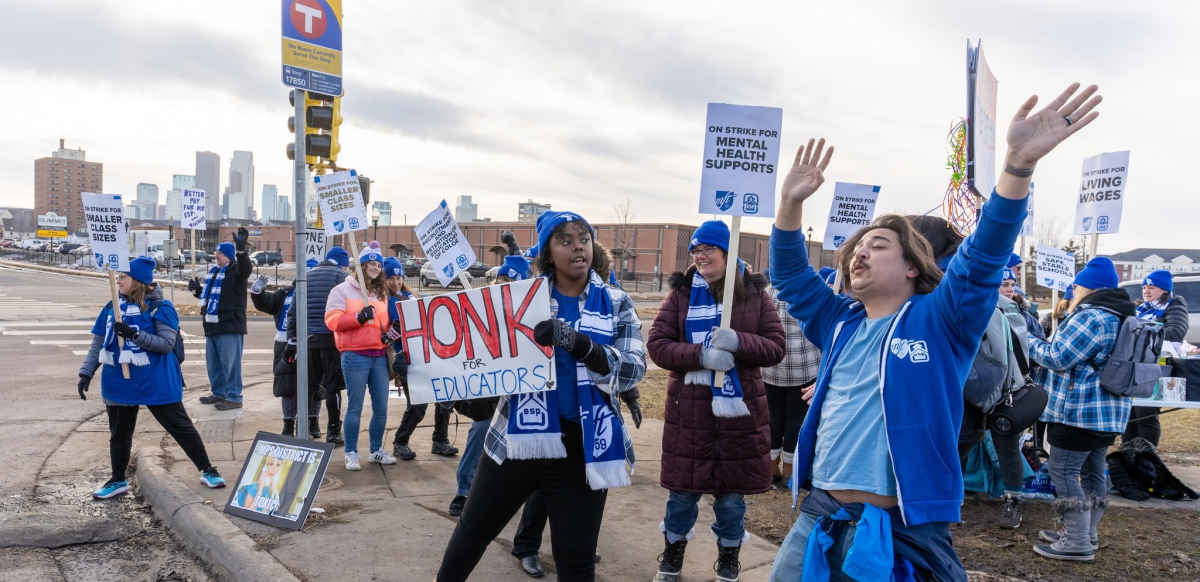Minneapolis Strike Wins Big Raise For Lowest-Paid Educators

The agreement includes language to support the retention of teachers of color while also preserving seniority rights. It increases the number of counselors, librarians, and nurses, and includes the first class-size limits in Minneapolis. Photo: Minneapolis Federation of Teachers
After three weeks on strike, members of the Minneapolis Federation of Teachers voted to accept a new contract that brought significant wins and made inroads on critical issues.
The wins: education support professionals (ESPs) will receive $4 more per hour over the two years of the contract and retroactively; they will also receive a one-time $6,000 payment split over two years and opportunities for more hours and days of work.
A substantial raise for ESPs, such as teacher’s aides, was a central strike demand. Previously ESPs topped out at $28,000 a year; now they will start at $35,000 thanks to the hourly wage increase and the opportunity to work more hours.
In the Twin Cities, most teachers are white and most ESPs are people of color. The two bargaining units struck together: 3,000 teachers and 1,000 ESPs.
The agreement includes language to support the retention of teachers of color while also preserving seniority rights. It increases the number of counselors, librarians, and nurses, and includes the first class-size limits in Minneapolis.
“Members showed up in a big way,” said Shaun Laden, ESP chapter president. “Strikes work. We were able to get the district to do things they didn’t want to do.”
High school English teacher Mary Manor, the vice president of MFT’s teacher chapter, called the agreements “the best contracts our union has seen in 20 years.”
KEEP BUILDING
Still, while these are big wins, there is a lot of room left to continue organizing. The memorandum of agreement includes extra hours and days for the rest of this school year. The opportunity to work extra hours is also part of the MOA, which expires in two years and thus those wins will need to be fought for again in the new contract.
Class-size caps are still very high—as high as 40 to 44 students at the high school level in designated “high-poverty” schools. Those levels don’t work for students and educators, but Manor notes it is the first time they have won class-size caps in the contract at all.
“We have to keep building on this win and start prepping now for the next contract,” said Ma’Riah Roberson-Moody, vice president of the ESP chapter.
Meanwhile SEIU Local 284, the food service workers at the Minneapolis Public Schools, settled without having to follow through on their strike threat. They won a $1-an-hour raise in year one and 75 cents in year two of the contract, along with a one-time bonus of $1,000.
While some educators are looking forward to next fights, others are trying to make sense of a return-to-work agreement that adds 42 minutes to the school day, a move that rankles educators, students, and parents—whose own work and childcare schedules are thrown out of whack. “It is simply punitive,” says Dan Troccoli, a high school history teacher.
“We learned we are up against powerful interests,” said Troccoli, reflecting on how much the strike was a battle against privatizers. “And now we have to deepen our democratic processes within the union and develop deeper ties with the community.”

SUPPORT LABOR NOTES
BECOME A MONTHLY DONOR
Give $10 a month or more and get our "Fight the Boss, Build the Union" T-shirt.
This story originally ran in Labor Notes #518.




